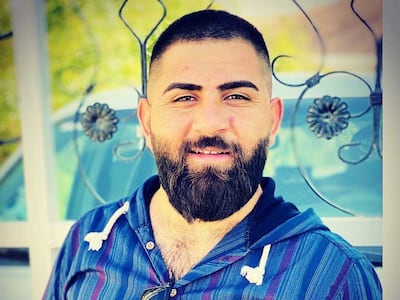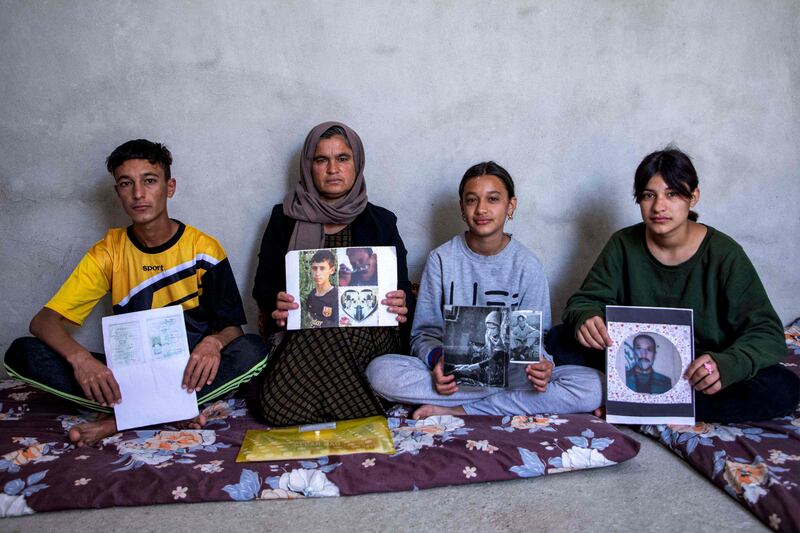In the weeks leading up to August 3, 2014, Dilshad Bakri's father told him not to leave the house alone. ISIS had already taken the major city of Mosul, two hours from their village of Khanasor in Iraq's Sinjar district, and the family were on edge.
“On August 3, I woke up to unclear news. People were saying southern areas of Sinjar were falling to ISIS,” the younger Mr Bakri told The National from Germany.
“We hesitated, torn between leaving our home and staying put. We decided to flee in our car with 28 other relatives. ISIS entered our village two or three hours later.”
An estimated 1,200 Yazidis were killed and 6,400 taken captive when ISIS attacked Sinjar in what many countries have recognised as a genocide.
“Too many lives were lost, too many families were ripped apart and too many traumas were inflicted on people who did not deserve them,” the chief of the UN’s mission to Iraq, Jeanine Hennis-Plasschaert, said at a commemoration event in Baghdad on Thursday.
Only about half of those abducted have been rescued, according to Kurdish officials in northern Iraq.
On the craggy peaks of the Sinjar mountain range, bordering Syria, nine years ago, hundreds of thousands of Yazidis sought refuge under the baking sun and waited in horror as survivors who arrived told of ISIS executing men in the streets and taking women to be sold in markets.
'No justice in Iraq'
Mr Bakri, then 16, fled to the town of Khanke in the Kurdistan Region of Iraq, now home to a large Yazidi camp for internally displaced people. His family then travelled on to Turkey, before arriving in Germany in 2016.
“We could hear gunfire as we left. My cousins fled to Sinjar mountain, where they spent a week under the sun, thirsty, hungry and cold. Some of my distant relatives were taken captive.”
He is one of thousands of Yazidis who has left for Europe since the genocide. While the vast majority of the community – around half a million – still live in Iraq, Germany is home to a large Yazidi diaspora.
Mr Bakri says he would never return to his homeland.
“Our homes are destroyed and there is no justice in Iraq. We are insulted in state circles in Mosul and the Kurdistan Region.”

Shirin Khalaf, from the northern village of Dugure, also lives in Germany. As a teenager, she fled to Sinjar mountain with her family and siblings where they were stranded for a week before moving to a refugee camp in the Kurdistan Region.
They reached Germany after several years in northern Greece following a perilous trip across the Mediterranean, where their boat almost capsized.
“Time goes by, but the pain is still just as strong. The hurts that you can’t see stays with you … the suffering continues,” she told The National from her home near Dortmund.
“Even though the dates on calendars change, the emotional and mental wounds don't change.
“You have to leave your childhood, dreams, and life behind overnight … every day feels like August 3, 2014, for us, because our women, mothers and sisters are still trapped by ISIS.”
Tens of millions of dollars have been poured into rebuilding Sinjar, demining villages and installing health clinics for those who do return. But leading Yazidi figures, including Nobel laureate Nadia Murad, have pleaded for authorities to secure the area and ensure safety above all else.
Farhad Ali is from the village of Solagh, home to one of the biggest mass graves in the Sinjar region, where older women from Murad’s village of Kocho were slaughtered by ISIS militants.
“It's a complicated day. I remember how ISIS shot at us, how my relatives died and people ran towards the mountain, screaming 'ISIS is following us',” he said from Sinjar.

But despite the almost complete defeat of ISIS, there has been little in the way of stability.
The presence of Iran-backed militias and Yazidi groups affiliated with the Kurdistan Workers' Party (PKK) have destabilised Sinjar, with civilians caught in the crossfire of regular Turkish air strikes, fearing more violence.
“Tens of people leave Sinjar every day for Europe. They say it is better to get killed on the border than stay in Iraq without a good life,” Mr Ali said from Sinjar, where he works with NGOs.
Mental health professional Mona Kizilhan has worked with Yazidi survivors of sexual slavery sent to Germany for treatment.
Survivors, especially women and girls, need more support, she told The National.
Girls and women need to be able to access education in Iraq, as well as funding to go abroad, she added.
For Mr Bakri, many obstacles lie in the way of Yazidis returning to Sinjar, including an uncertain agreement over its governance between Baghdad and the Kurdistan Region's government.
“There is progress here but it isn't quick enough. Most people in Sinjar have nothing. People who leave IDP [internally displaced people] camps have no shelter to return to.”







